Today I’m really excited to be hosting interviewing author Amy Boucher Pye, author of the popular Finding Myself in Britain, and GIVING AWAY TWO COPIES OF HER BOOK. Find out what Americans find surprising about Brits, the unexpected costs of leaving your own country, and what it means to find your identity in Christ when you feel like you don’t belong anywhere. Enjoy!

- Hi, Amy – tell us a bit about you!
Hi! Well, I’m married to an English vicar and we live in a lovely but draughty vicarage with our two wonderful kids. I’m a writer and speaker with a long history in editing; I love writing devotional thoughts and running the Woman Alive book club.
I grew up in Minnesota – the land of 10,000 lakes and hearty people who survive the shockingly cold winters. I’ve now lived longer outside than inside of Minnesota, however, for when I was at university I went to Washington, DC, for a studies program – and ended up staying 10 years! When there, working with a wonderful Englishman-in-America, Os Guinness, I met a visiting Englishman who was studying abroad as he trained to be a vicar. We fell in love and married and I moved to the UK nearly two decades ago – a mind-boggling amount of time.
Something you might be surprised to know is that I’m a (lapsed) aerobics teacher. I love going to the gym and enjoying group exercise with my friends.

Amy with her siblings
- You’re American, from Minnesota. Can you give us a snapshot of what life looked like for you when you grew up?
I’m the middle child, and my growing-up years were shaped in part by family trauma. When my younger brother was three (and I was six), he nearly died of Crohn’s disease. He was in hospital for months and was getting progressively worse – he couldn’t keep any food down and was nearly starving. My parents asked our priest (I grew up Roman Catholic) to visit, and he did and he prayed for Paul. Paul was healed of the disease, amazingly, but when he started gaining weight, it emerged that he had a strong case of epilepsy.
My poor parents were torn between caring for me and my sister while also needing to be with Paul in the hospital – and my dad needing to work. Paul eventually came home again, but over the years we had many more times of ambulances coming in the middle of the night when Paul would have bad episodes (continual grand mal seizures turning into what’s called status epilepticus) or when he broke limbs after falling, sometimes because of seizures.
I knew my parents were doing their best with juggling Paul’s needs and those of me and my sister as well as coping with a massive lack of sleep. I’ve never doubted their love for me, but I also didn’t acknowledge for some years the pain I had felt at times – watching Paul suffer and wondering where I fit in. But God brought healing through a prayer ministry I came in contact with in my early twenties, and I’m so grateful.
As a family we had lots of normal moments too – going swimming in one of Minnesota’s many lakes, visiting my grandparents on the farm in Iowa, going to school functions (I played trombone and was in choir), eating dinner in the screened-in porch in the summer.
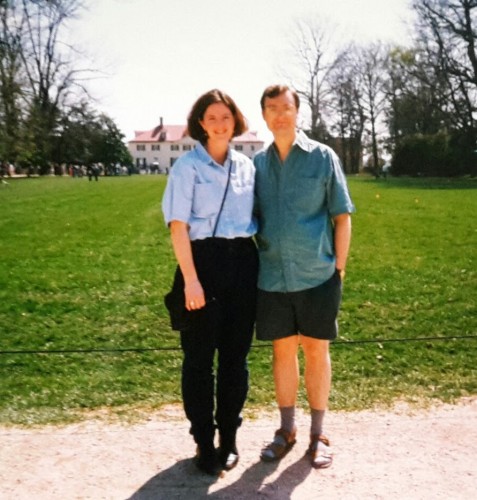
- Of course, life all changed when you met your British husband, Nicholas, who was in America, training to be a church minister. Was it love at first sight?
It was for him! He had been in northern Virginia for about six weeks at the theological college where he came for a semester, and without a car to get around, he was itching to meet some “normal Americans.” A fellow seminarian invited him to join us for our reading group (book club), and when I walked in he had an “a-ha” moment. He asked me out the next week and soon we fell in love and quickly started talking about marriage – even though we didn’t get engaged for six months, for an engagement for me meant giving my notice at work and telling my friends and family that I was leaving.
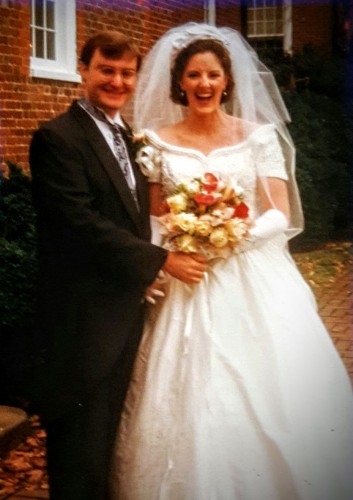
- In Finding Myself in Britain, you admit that when you first agreed to marry your charming husband, you didn’t fully think through the cost of moving to a different country to your own. What are some of the costs and sacrifices of living in a country different to your own? What are some of the gifts that this experience has given you?
The main cost and sacrifice is being so far away from family and friends. When I left, my parents were in their late fifties, and now they aren’t! My niece and nephew were 5 and 3, and now they’re all grown up and in their twenties. Time passes and I miss not being there not only for high days and holidays, but for the everyday experiences of “Sunday dinner at grandma’s” or going shopping with my sister. With my friends, it’s also challenging to be so far away – such as not being able to just be with someone who is going through a hard time. When I do go to the States, it can feel like a frenzied flurry of squeezing in visits (and offending those friends whom I don’t get to see) along with spending time with the family. (And shopping at Target and the Mall of America!)
The gifts of living abroad have been massive. I’ve learned so much about what I think and believe from having been taken out of my culture-of-origin. When I first moved here, for instance, I worked with several Christians who were strong members of the Labour party. I had lived in the nation’s capital, in Washington, DC, for 10 years, and so was familiar with political discussions. But so many Christians there assumed that if you loved Christ, you’d also love the Republican party. I began to see how the culture can shape one’s beliefs.
Other gifts have been the creation of our family’s traditions. Because of being on this side of the Atlantic, I haven’t been able to lean on my family for the hosting of holidays – I’ve had to learn how to make the special food for our Christmas Eve dinner, for instance. Nicholas and I have formed new traditions and created special memories that celebrate both heritages.
I could list many more gifts, but will limit myself to a few – the NHS, the BBC, no regular school shootings, Wimbledon with strawberries (and no adverts), a son who loves footie, a culture steeped in history, school uniforms (never thought I’d say that), a climate that helps slow the ageing process.

Amy and her husband, Nick, at Henley
- When you first came to Britain, what three things most surprised you about the culture and customs?
I was in such a daze those first few years with the huge changes of leaving country and my independent single life that I don’t think I could list three specific things. My boss-in-America, Os Guinness, had tried to warn me that it would be the little differences added together that might trip me up – we assume that the cultures are so similar, so we don’t expect there to be differences. And he was right.
One area of difference has been language (to which I devote a chapter in my book). I knew at first, for example, that I shouldn’t use the word, “parking lot,” but I couldn’t remember the correct term. Or when I was trying to tell the transit company that was delivering my stuff over from the States that the access road to the block of flats where we lived was big enough to fit for a garbage truck, I really struggled! (Dust-bin cart?)
A second thing was the lack of friendliness, as I perceived it. One evening a week or so after arriving, I was invited to the group for spouses at the theological college where Nicholas was training. We sat in a circle and they introduced me, and then I waited for them to each introduce themselves, telling me their names and a little bit about themselves. It didn’t happen! I didn’t know then that one only offers one’s name at the very end of the conversation (and then, only if both parties have decided they like each other), and with a hint of embarrassment. Now when I go back to the States I’m taken by surprise by all the smiles and “hello’s” when out for a walk!
Third was the weather (again, a chapter on this topic). I had heard the jokes but hadn’t considered how much change an island can experience weather-wise in a short amount of time. I soon grew to appreciate how the weather is a safe place to launch into a friendly conversation of shared grumbles.
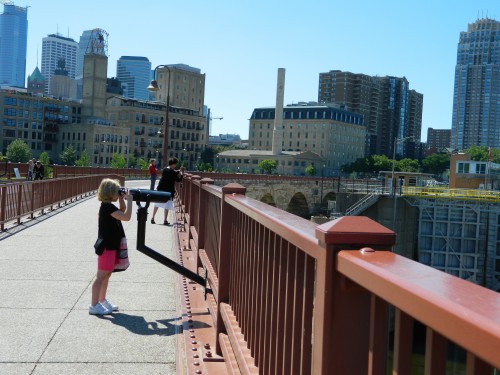
Minneapolis
- What do you think most Brits think of Americans – what prejudices do you encounter? What effect does this have on your identity?
A woman at one of the churches where Nicholas was on staff used to make joking comments about America that felt like poison arrows striking into my soft flesh. I probably should have confronted her, but as these were little asides on topics such as capitalism, pronunciation of words, and so on, I never did.
Such as with this church lady, prejudices that I’ve encountered tend to be veiled, for people are too polite to name them outright. But at times I feel “edited” – that I need to rein in my exuberance or friendliness or love of the big, bold, and outlandish because these things don’t fit into “proper” British categories. At first when I moved here I shrunk back into myself, not wanting to stand out, but over the years I’ve come to see that I’m best when I’m myself, when I’m living freely and not self-consciously; that is, picking apart all of my actions and responses. I do have a tendency to apologize still, however, as my lovely interviewer knows and gently calls me on!
And sometimes I adopt the caricatures when I want to let my hair down, like being the “loud American” in Zumba classes when I whoop and holler along with the instructor. She loves the energy and wishes more of her fellow Brits would join in!
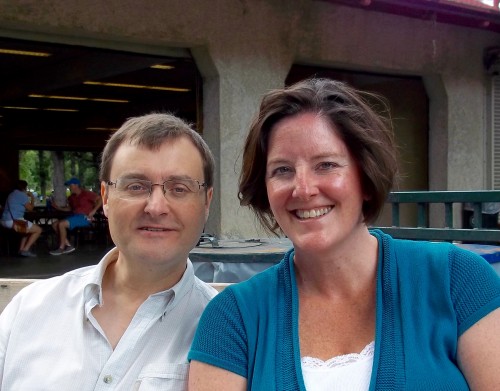
- Your book is called ‘Finding Myself in Britain’. To what extent has living in Britain been a loss of identity for you, and to what extent did you find your identity here?
When Jesus sent out his apostles to share the good news, he told them that those who lose their lives for his sake would find them. I haven’t lost my life, but sense that living in Britain has helped me to shed a lot of dead skin as my true self has emerged. We learn who we are in community, and I hope I keep on finding myself as I love and talk and share and pray with others. I’ve found myself in Britain as I’ve figured out, with God, who I am in this culture as a foreigner-turned-friend.
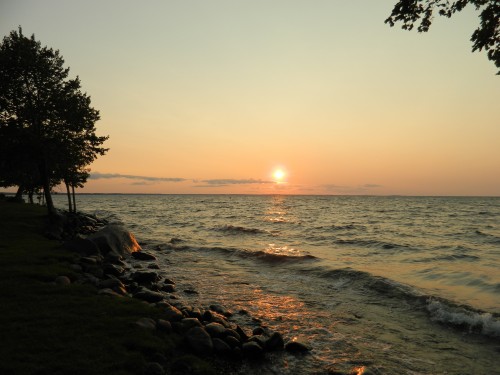
Sunset in MN
- When you consider your move from your life in America to your new life here, twenty years on, what Bible verses are particularly important to you?
As I recount in the epilogue, I wrote in my journal eight months into life in the UK:
At times it seems so hard being a foreigner. Reading my Psalm for the day brought such thoughts to my mind. The Psalmist is crying out: “Reach down your hand from on high; deliver me and rescue me from the mighty waters, from the hands of foreigners whose mouths are full of lies, whose right hands are deceitful” (Psalm 144:7–8).
But my thinking has changed, and two Bible passages I focus on in the epilogue now mean so much to me. One is Psalm 16:5–6: “Lord, you have assigned me my portion and my cup; you have made my lot secure. The boundary lines have fallen for me in pleasant places; surely I have a delightful inheritance.” For me, my boundary lines have fallen in a green and pleasant land. At first those boundary lines felt constraining, but slowly I realized that if I were to escape the fences, leaving my verdant green patch, I’d be out in the wilderness, subject to bulls, foxes, and other vermin. The boundary lines drawn by the Lord give me a place to flourish; place to call home; a place to find myself.
The other passage is Mary anointing Jesus’s feet in John 12, which I like to think of as liquid love. Nicholas and I had that passage at our wedding, for we hoped our marriage would be characterized by loved poured out with extravagant giving.
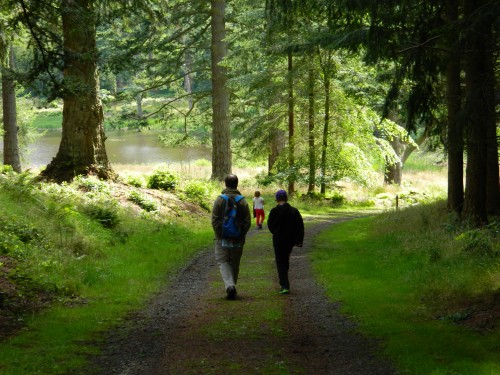
Walking with the family in the UK
- Finally, which kind of people might enjoy your book?
I’m told that ex-pats and Anglophiles resonate strongly with it, but I hope that my British friends will enjoy it too, for sometimes it takes a stranger to highlight one’s customs, quirks, and delights. My book is a through-the-year look at British life, so it lends itself to dipping in and out of with a cup of tea. And yes, I devote a whole chapter to the nation’s favo(u)rite drink! I hope your readers will brew up a cuppa and join me as we explore the search for faith, home, and true identity.
 Amy Boucher Pye is a writer, speaker, editor, and reviewer. She is an American who has lived in the UK for 17 years, married to a vicar. She runs the Woman Alive Book Club and writes regularly for other publications, including devotionals. She loves to write and speak about God’s surprising grace; how he breaks into our lives and empowers us to transform the ordinary. Her first book is called Finding Myself in Britain: An American’s Reflections on Faith, Home, and True Identity.
Amy Boucher Pye is a writer, speaker, editor, and reviewer. She is an American who has lived in the UK for 17 years, married to a vicar. She runs the Woman Alive Book Club and writes regularly for other publications, including devotionals. She loves to write and speak about God’s surprising grace; how he breaks into our lives and empowers us to transform the ordinary. Her first book is called Finding Myself in Britain: An American’s Reflections on Faith, Home, and True Identity.
Tweetables:
[tweetit]What are the unexpected gifts and costs of living abroad? – interview with @AmyBoucherPye plus GIVEAWAY:[/tweetit]
[tweetit]What does living abroad do to your identity? – interview with @AmyBoucherPye plus GIVEAWAY:[/tweetit]
[tweetit]What do Americans find surprising about Brits? – interview with @AmyBoucherPye plus GIVEAWAY:[/tweetit]
Over to you:
- What do you find surprising about Amy’s perceptions of Britain?
- Have you ever lived abroad? What were the gifts and costs of so doing?
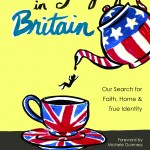 ***GIVEAWAY: Two copies of Amy’s book will be given away! To enter, please leave a comment below and/or tweet a link to this page. (Limited to UK entries only, sorry. I’ll announce the winners next week.)***
***GIVEAWAY: Two copies of Amy’s book will be given away! To enter, please leave a comment below and/or tweet a link to this page. (Limited to UK entries only, sorry. I’ll announce the winners next week.)***


My story is very similar. I am American, and came to England 16 years ago to do a gap year with YWAM. I fell in love with a young man on my course, got married, and never returned to live in the States. I love living in the UK, and have also found that being in a different culture makes you really think about what you believe. It shows you just how many things that, especially as Christians, we take as given are actually cultural constructions which aren’t true for all people everywhere. I find it endlessly fascinating.
I have loved hearing a bit of your story, Amy. 🙂
Even though I didn’t live in England very long, I think I’d really enjoy this book. I imagine Sweden and Britain are more similar culturally than Britain and the US are, but it would be a lot of fun reading about Amy’s experience. I think I’ll especially enjoy the chapter about tea. For the record, I’ve never met a Brit who drinks as much tea as I do. 😉
What surprised me about this interview was the lack of friendliness Amy perceived. Most Swedes find the British to be very friendly and helpful compared to people here!
Hi Rebecka! So are you living in Sweden? Interestingly, where I grew up in Minnesota we sometimes call it the ‘land of 10,000 Swedes’ because so many immigrated there from Sweden. I hear it’s a beautiful country and hope I can visit sometime.
My daughter-in-law came to America after meeting my son in Scotland at a Braveheart convention! Raised in London, I’m sure her experiences were as hard at times as Amy’s. I often still, 13 years later, still misunderstand Katy at times. I see some of the Brit in my 10 year old grandson and wonder if Amy’s son has taken on some of her Red, White, and Blue? Wonderful post and sounds like a book I’d love to read.
My son is firmly English in outlooks and views – but he does like American football with me (although a firm Chelsea supporter). But my daughter, interestingly, has a bit of an American accent and identifies strongly with the country. How interesting that your grandson has done the same – is he a football (soccer) supporter?
As a Brit who had lived in The Democratic Republic of the Congo, Belgium and France, I found a lot of the article rang so true. Apart from the cultural differences, the French of each of these countries had it’s variations too. Sometimes it was a lonely road and we often saw our children going through tough times but they were also times when we drew closer as a family and closer to God as we relied so much on his protection. Now, as adults, our children look back on those years as great experiences and consider themselves privileged to have had them and are much more well-rounded people with great awareness of the world and the needs of its people.
This post really resonates with me, as a ministers wife (of 4 years) who has left a lot of friends and family in England for ministry in the north of Scotland. I often feel so alone and far away even though the distance between is far smaller than the distance between the US and UK, and friendships are not as deep here yet. Thank you for posting!
What fun! I read Amy’s book and loved it.
The theological college scenario … I think that represents a certain kind of emotionally-uptight middle-class culture that I’m certainly familiar with (being a middle class Englishwoman myself) but thankfully not every Brit is like that. People in the North of England tend to be friendlier (and also more direct!) Yes, I’m painting in broad brush strokes here, but it’s largely true. I must also be blunt and say that a certain type of emotional frigidity can exist in some Anglican circles (I can say that as an Anglican myself).
It’s quite true that two Brits who are strangers can have a perfectly affable conversation without ever finding out each other’s names, LOL – but in the scenario Amy describes, I would consider it pretty rude NOT to introduce yourself, ESPECIALLY to a person who is new to the group. It’s quid pro quo: if I am introduced to someone, I expect them to introduce themselves too and if they don’t, I ask them! I must have learned that directness from my American friends, hah. I’m polite and friendly about it, but for goodness sake … I have little patience with my fellow Brits when they’re THAT reserved, I think that’s ridiculous.
I’ve been pleasantly surprised and pleased that American and Aussie friends visiting London have found Londoners friendly (the response of Londoners: “really?!”) An experience as a tourist is very different from living in a country, though! 😉
Hey Philippa! 🙂 To be fair to the theological college peeps, I don’t think it even occurred to them to share their names – they weren’t trying not to be friendly, but rather that was just the cultural backdrop. I do wonder what would have happened if we’d be in the North.
You have some good observations!
What a fascinating read! Re the friendliness thing, we British seem to be becoming worse and worse at it – at least in the south. I was in Manchester earlier this year and people talked to me in the street and on buses.
I have a few thoughts: is it something to do with how urbanised we are, and how packed together that we enforce privacy between each other? From what I remember of visiting New York they weren’t friendly, and a lot more rude than I encounter here.
How ‘real’ is the American friendliness? I’ve worked with some really friendly Americans where it felt like friends… who then ripped off the company and were just as friendly afterwards. You get nice swindlers in every country, but I found it difficult to pick them out against the normality of ‘niceness’ in America.
Reverting to the post: we could do with some of that American vivacity here! What is it with Brits seeming like they’re half-dead??!
Peter, I think you’re on to something about the quietness in the Tube, say, as all of that enforced closeness requires its own coping mechanisms. And now when American friends visit and we are on the Tube today, I feel very self-conscious, wondering what all the people in the carriage are thinking about us!
In terms of the depth of the friendliness, I agree with you. When I first moved here, an American who had been here a decade said that although it’s a huge generalization, Americans will be friendly to a surface level but then will quickly move on to the next set of friends. While the Brits will take a long time to get to know, but then will your friend for life.
Thanks for your comments!